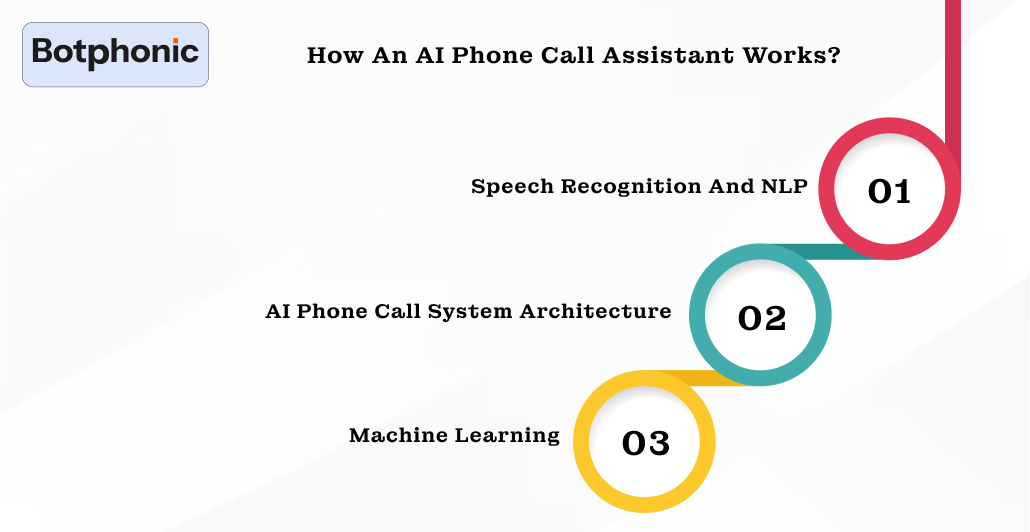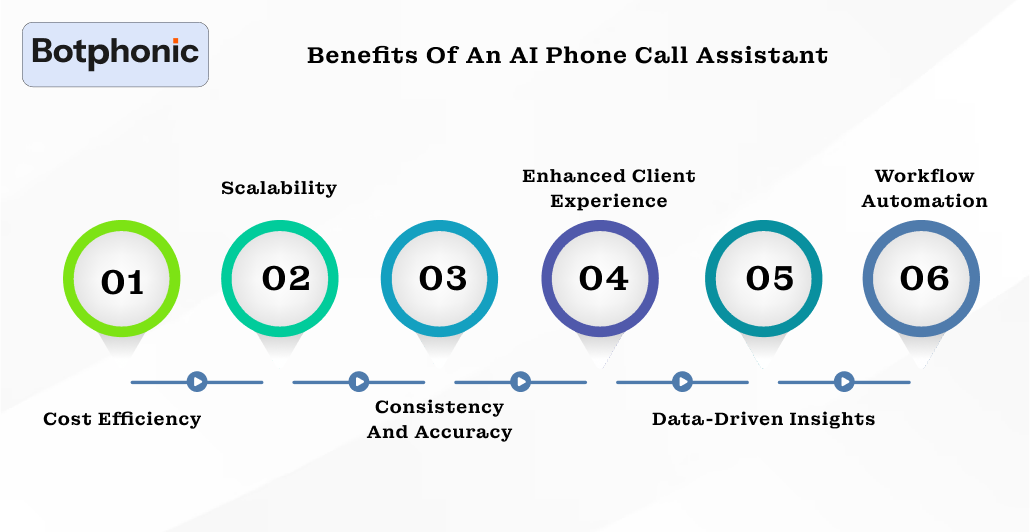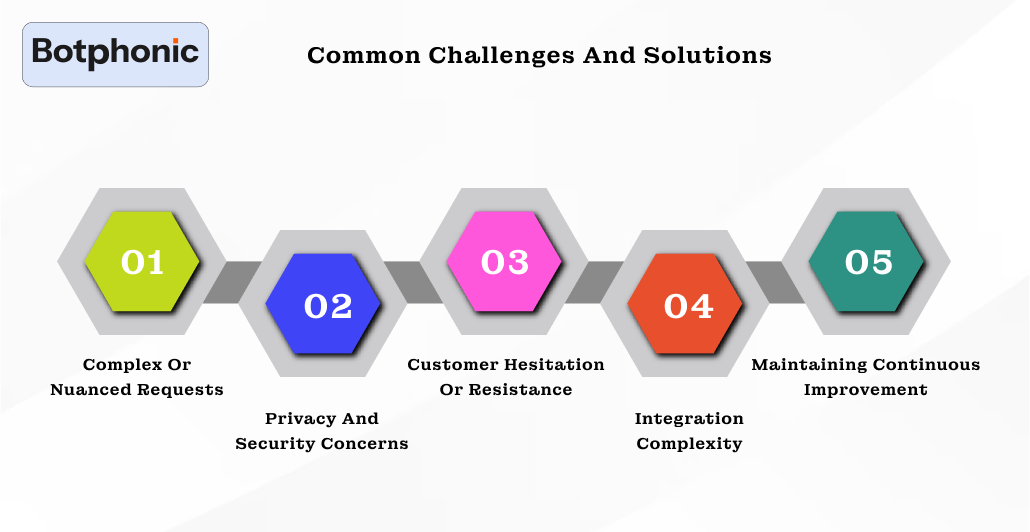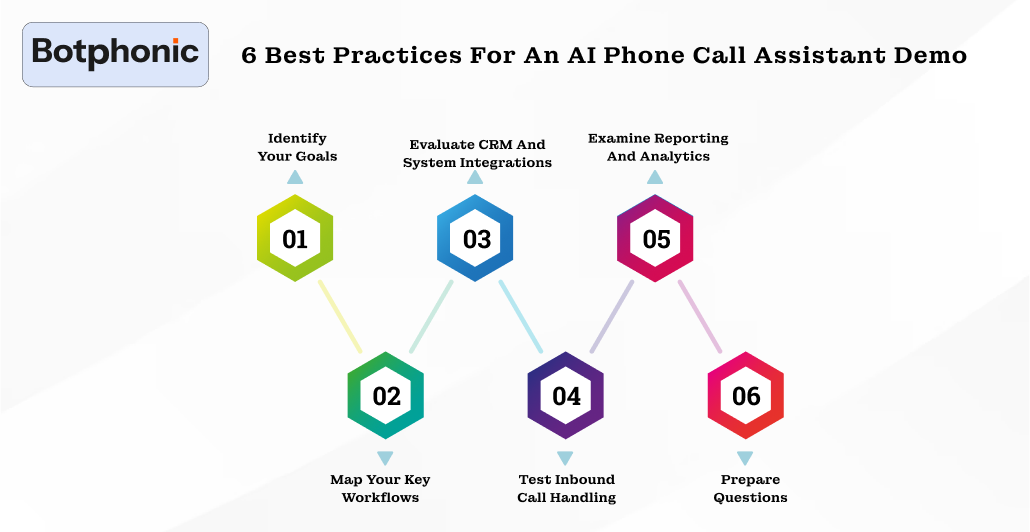
Summarize Content With:
Quick Summary
In today’s smart and hyper-competitive world, customer experience is no longer just a metric but has become a strategic differentiator. Yet, some companies are still using phone support like it’s 1988. There are still long hold times, frustrated customers, inconsistent answers, and human agents are getting stretched thin. But with the AI phone call assistant demo, you have a practical yet scalable solution that modernizes customer service without going overboard throughout the process.
In this blog, we will explore how an AI phone call assistant works, its benefits, and even some real-world use cases. And while exploring, we will also be checking AI call assistant technology, workflow automation, system architecture, CRM integration, inbound call handling, and recording and analytics.
Introduction
Customer expectations have evolved, and so should phone support. The AI phone call assistant is rapidly becoming a strategic asset in companies. They are aiming to reduce operational costs, improve service quality, and even scale support without any additional headcount.
With the AI phone call assistant demo, a modern, scalable, and efficiency-driven solution, it has enhanced the phone support system in the present day. Combining AI call assistant technology, workflow automation, CRM integration, and real-time analytics, businesses are delivering faster, personalized, and frustration-free support.
Understanding AI Phone Call Assistant
An intelligent AI assistant that effectively uses progressive technologies like speech-to-text, deep learning, and natural language processing to manage customer interactions over the phone. Contrary to those interactive voice response systems that still rely on a rigid menu, AI assistants can easily understand context, recognize intent, and respond to those queries in real time.
In practice, this only means that businesses can easily:
- Provide 24/7 support without requiring additional staff.
- Offer customized responses using the client’s history.
- Streamlining day-to-day activities including tracking orders, scheduling management, or complex customer queries.
Just think of it as a highly trained agent who never sleeps, never forgets, and never even gets frustrated.
How an AI Phone Call Assistant Works?

AI phone call assistants have merged several technologies to make a cohesive and automated system.
1. Speech Recognition and NLP
The assistants effectively transcribe spoken language into text using speech recognition. After which, NLP helps in interpretation by using one-hot encoding and other methods. It allows the system to answer questions intelligently rather than following a fixed script.
2. AI Phone Call System Architecture
A robust AI phone call system architecture ensures that these conversations are scalable, secure, and reliable. Here are the prime components :
- Voice recognition engine: Converting spoken language into text
- Intent classification module: Determines customer needs.
- Response generation: Provides human-like, contextually relevant replies.
- Backend integration layer: Connects to CRMs, databases, and analytics tools.
Together, these layers assist in creating an automated workflow that can handle thousands of calls without dropping the quality of the call.
3. Machine Learning
With machine learning, the system eventually gets smarter over time. Every call provides data that the AI uses to improve its responses and understand new customer questions while optimizing conversation flow. It also mitigates errors and customer satisfaction.
The system gradually becomes more intelligent thanks to machine learning. The AI uses the data from each call to enhance its responses, comprehend fresh client inquiries, and maximize dialogue flow. With every interaction, this lowers errors and raises customer happiness.
AI Phone Call Workflow Automation
The purpose of AI phone call workflow automation is to relieve human agents of time-consuming and repetitive duties. For example:
- Administering appointments and reminder duties.
- Verifying payment or billing questions.
- Providing simple troubleshooting guidelines.
While AI is effectively managing high-volume and low-complexity interactions, automation guarantees that human agents concentrate on complex tasks. It also results in providing faster response times, reducing operating expenses, and improving customer experience as well.
Benefits of an AI Phone Call Assistant

1. Cost Efficiency
Effectively reduces the cognitive load as most tasks handled by the AI phone call assistant. By automating high-volume calls and routine queries it offers great assistance. The results are seen as reduced expense for hiring, training, and operations without compromising the quality of the services.
2. Scalability
AI phone call assistants can take hundreds or thousands of calls at once, even in contrast to human agents who can manage only one call at a time. It’s ideal for emergency situations, product launches, or even seasonal surges.
3. Consistency and Accuracy
Each call is managed by the same criteria. Human tiredness, overlooked details, and conflicting communications are nonexistent. This feature guarantees that clients always get a precise and expert response without any delay.
4. Enhanced Client Experience
AI phone call agents have shown a significant increase in client happiness and in fostering loyalty by offering prompt responses. Also assisting with round-the-clock availability and tailored support, it helps resolve queries as quickly as possible.
5. Data-Driven Insights
AI phone call recording and analytics actually help provide actionable insights from all the conversations made. Businesses can forecast the trends, track performances, and optimize workflows based on real data.
6. Workflow Automation
Automating routine operations, such as booking appointments, billing inquiries, or just answering frequently asked questions, frees up human agents. It allows human reps to concentrate on complicated problems.
Common Challenges and Solutions

1. Complex or Nuanced Requests
Challenge: AI might not be able to understand thoroughly or handle very complex inquiries.
Solution: A hybrid system where AI performs routine tasks but human agents take on the complex issues thus the customer gets satisfied and the business still benefits from the efficiency.
2. Privacy and Security Concerns
Challenge: Sensitive customer data has to be dealt with in a way that is in strict compliance with regulations such as GDPR or CCPA.
Solution: Protect customer information by using encrypted data channels, secure storage, and compliance audits, thus winning trust.
3. Customer Hesitation or Resistance
Challenge: There are still customers who want the personal touch of a human voice and they might be doubtful as regards the AI support.
Solution: Make clear what AI’s role is, offer the possibility of talking to a live agent, and emphasize the improvement of human interaction instead of its replacement.
4. Integration Complexity
Challenge: Bad integration with CRM or other systems might result in data being fragmented and the customer experience being disjointed.
Solution: Strong CRM integration and testing should be performed, which means the AI Call assistant will have access to all customer information and workflows that are relevant.
5. Maintaining Continuous Improvement
Challenge: AI is to be constantly learning and refining to remain accurate and effective.
Solution: The reviewing of call recordings, analysis of performance metrics, and updating of AI models to reflect new products, services, or changes in customer needs are to be done on a regular basis.
6 Best Practices for an AI Phone Call Assistant Demo

Requesting a demo is one thing, but getting actionable insights along with the demo is another. A well-prepared demo will always help you see how an AI phone call assistant is working. How is it adapting in your unique environment and helping you evaluate its real impact on workflow, efficiency, and customer experience? Let us tell you how you can get the most out of your demo:
1. Identify Your Goals
Before the demo, you should clear what you actually need after setting up an AI phone call assistant. Is it:
- Reduced call wait times?
- Automated FAQs or other common queries?
- Improved inbound call handling?
- Gaining actionable analytics for management reporting?
Knowing your goals allows the vendor to tailor the demo to your business and focus on the features that really matter.
2. Map Your Key Workflows
Make a summary of the phone support processes you’d like to explore. For example:
- Typical inbound calls
- Repetitive tasks frequency
- Escalation procedures
This process makes it possible for the AI demo to demonstrate workflow automation and demonstrate how it will function with your current systems.
3. Evaluate CRM and System Integrations
A smart AI assistant is designed to work flawlessly with your CRM and other backend systems. It should work as more than just a talking bot. In the demo, you have to look out for:
- Real-time access to customers’ data.
- Automatic recording of interactions.
- When triggered, a steady transition to live agents
With this, it guarantees that the solution isn’t producing data silos and showcases the full potential of AI phone call integrations.
4. Test Inbound Call Handling
During the demo, ensure to mimic the actual client situations, such as:
- Asking FAQs regarding goods and services
- Making an appointment
- Inquiries about billing
- Complex situations that need escalation to humans
After these, check how your system is prioritizing, routing, and resolving queries for inbound calls. A strong demo will prove its accuracy, quickness, and adaptability.
5. Examine Reporting and Analytics
Ask your vendor to give you a tour of the AI call recording and analytics dashboard, and see if it shows:
- Average time to resolve a call
- Indicators of customer satisfaction
- Pain points or common call topics
- Performance indicators for human vs AI interactions
This is your chance to know and learn about the RPO, operational insights, and decision-making advantages that the AI assistant is going to provide.
6. Prepare Questions
Bring a list of inquiries, which are specific to your company, such as:
- How can workflow automation be improved by AI?
- Is it capable of managing seasonal increases without any human assistance?
- How fast does it learn from new interactions?
- What security measures are taken for client information?
- Can the AI system be customized based on industry or product?
A demo is more than just a casual walkthrough; it’s an opportunity for you to observe the assistant in use and validate that it fulfills your business needs.
A well-prepared demo ensures that you can evaluate AI phone call workflow automation, CRM integrations, inbound call handling, and analytics collectively. It’s easier to compare options, evaluate ROI, and determine how the assistant fits into your business.
Transform your operations, cut costs, and elevate your customer experience with an AI phone call agent.
Try Demo Now!!Conclusion
An AI phone call assistant is a transformative solution that’s improving efficiency, enhancing customer satisfaction, and providing actionable insights. Automating routine tasks, Integrating AI Phone Calls With Your CRM, managing incoming calls smartly, and offering robust analytics, it encourages businesses to deliver faster and more personalized service.
Requesting a demo allows the team to see AI in action, evaluating workflow automation, CRM integration, inbound call handling, and analytics. Leveraging AI call assistant technology allows businesses to enhance their workflow automation and CRM integration. Moreover, it also resolves routine inquiries, provides personalized responses, and delivers insights that can be put to use.

